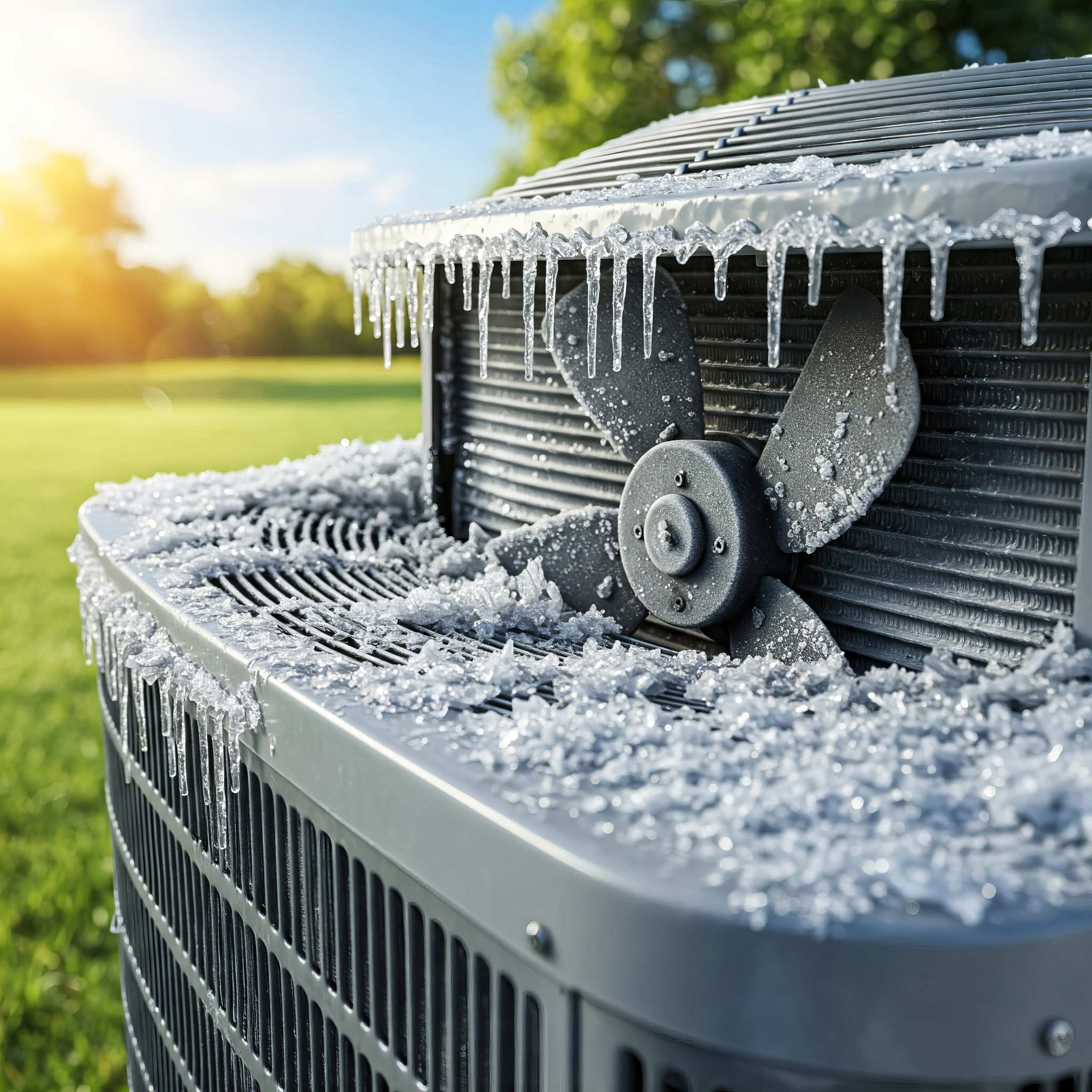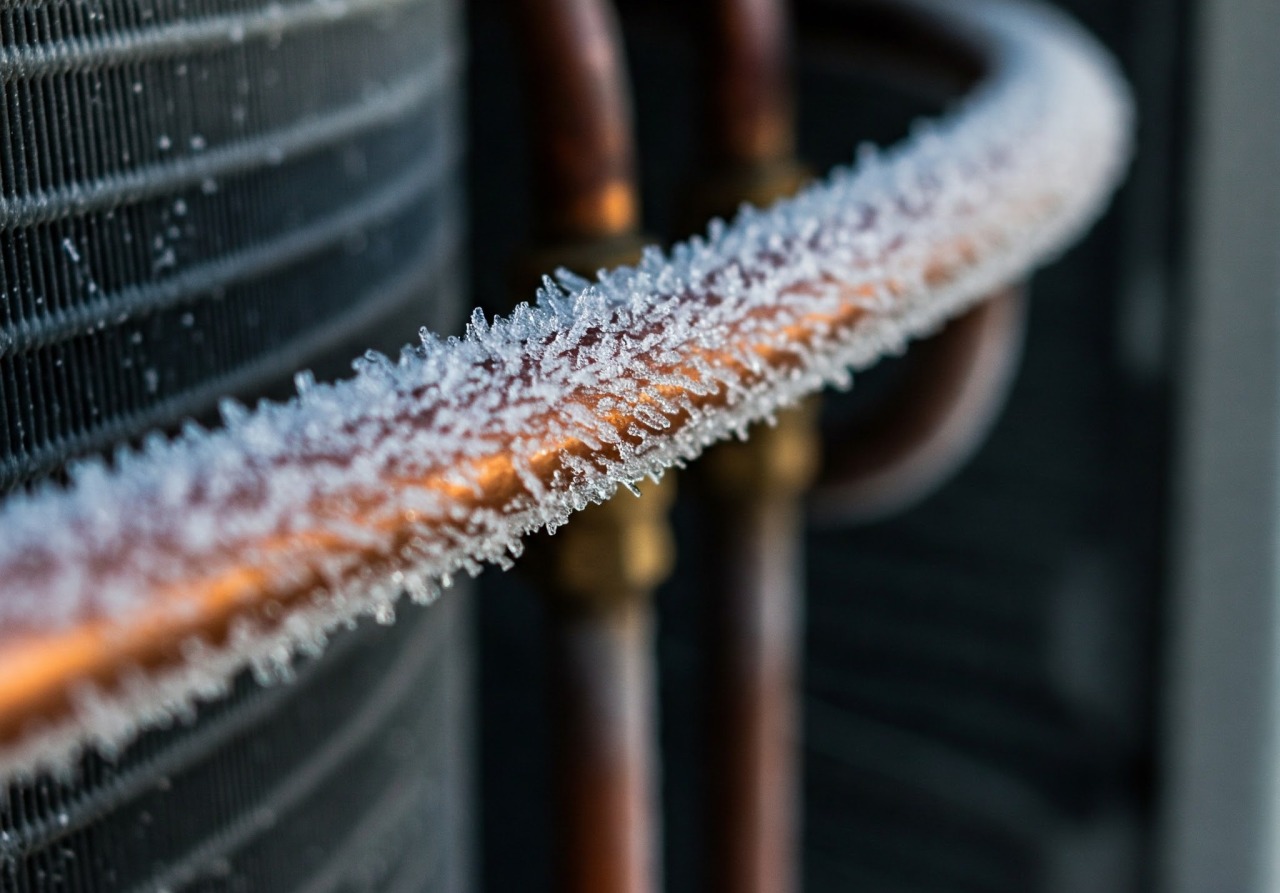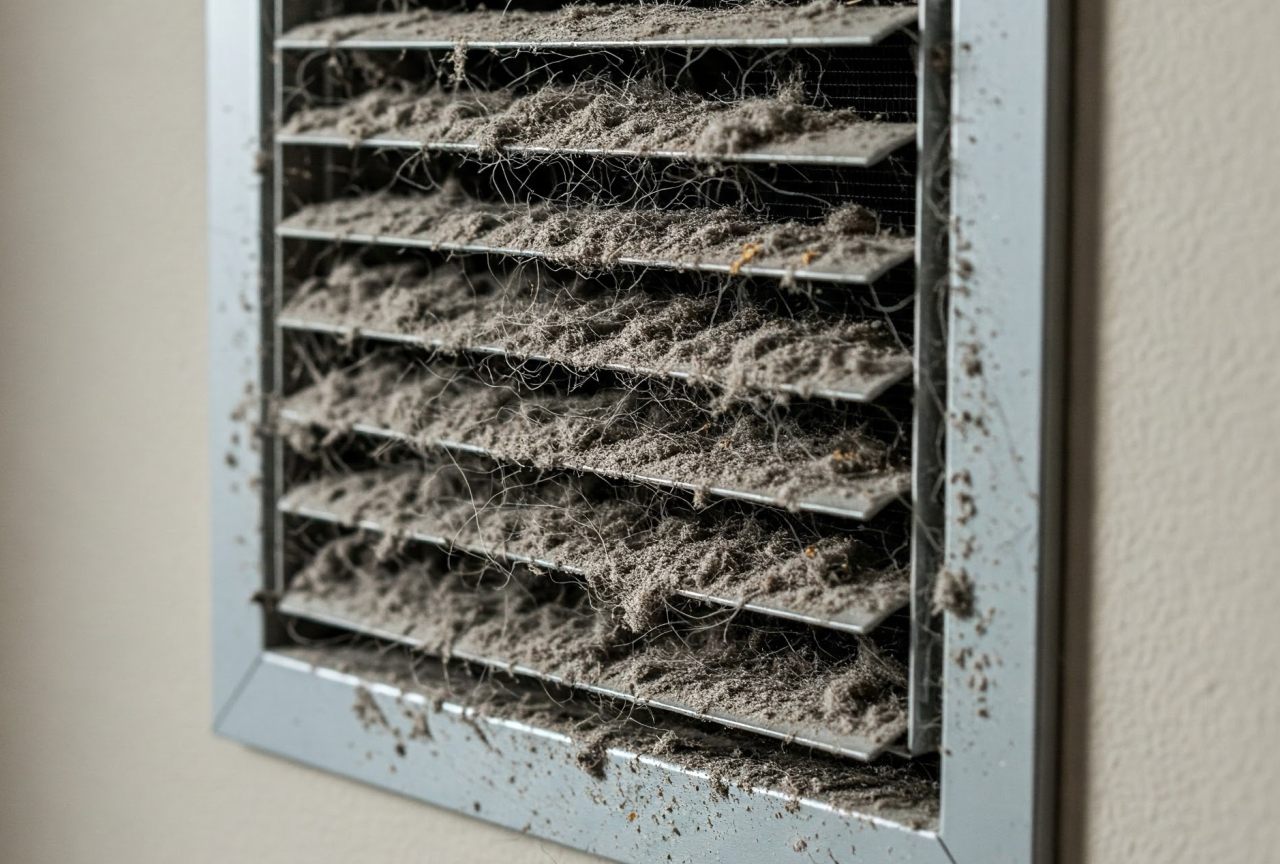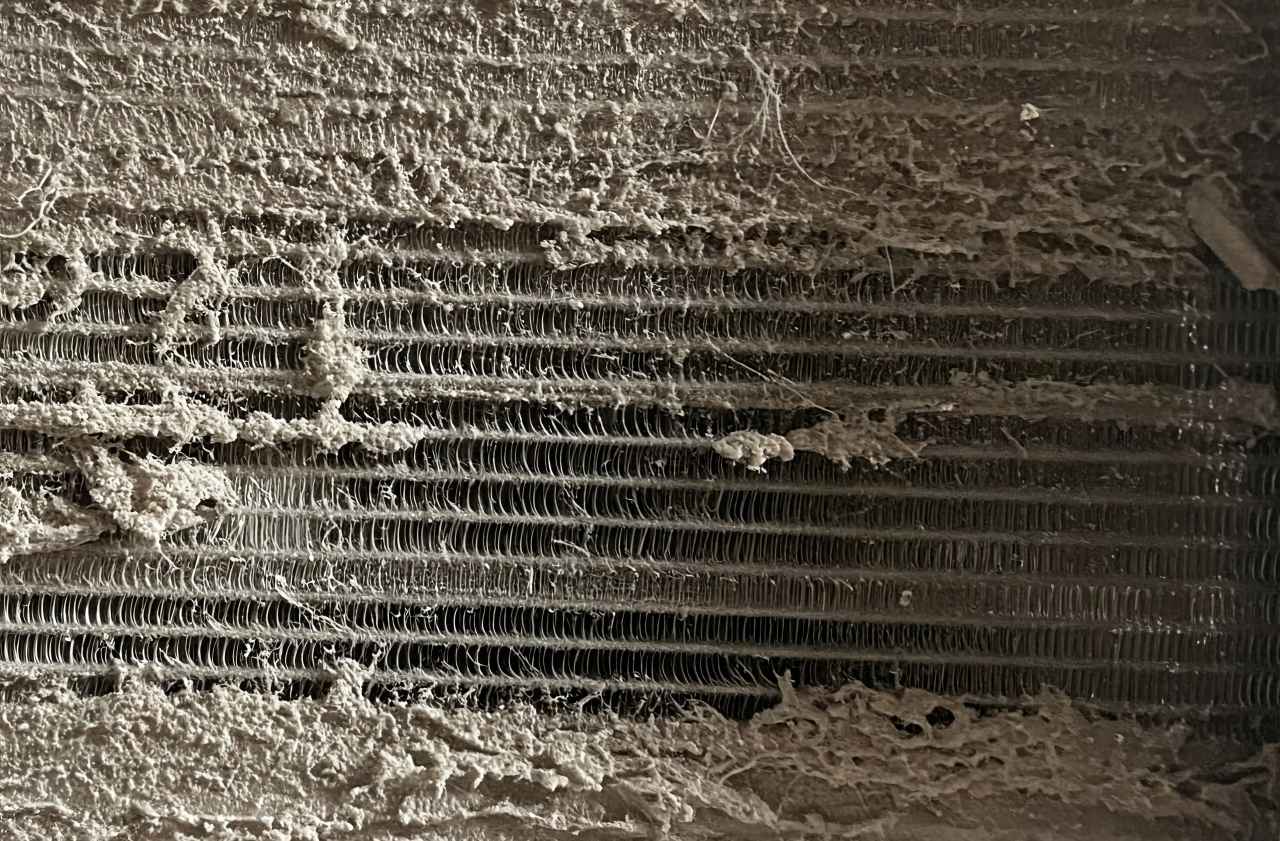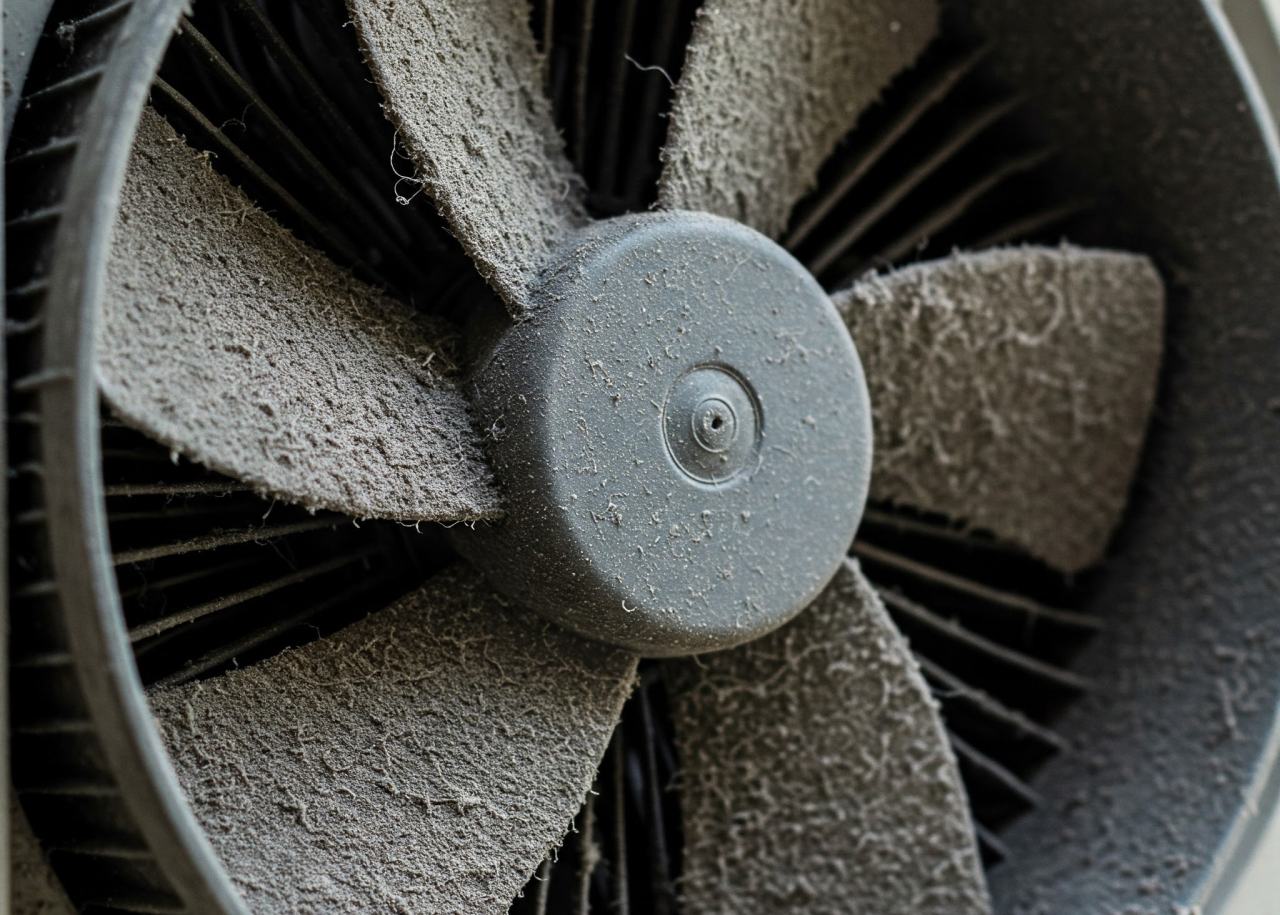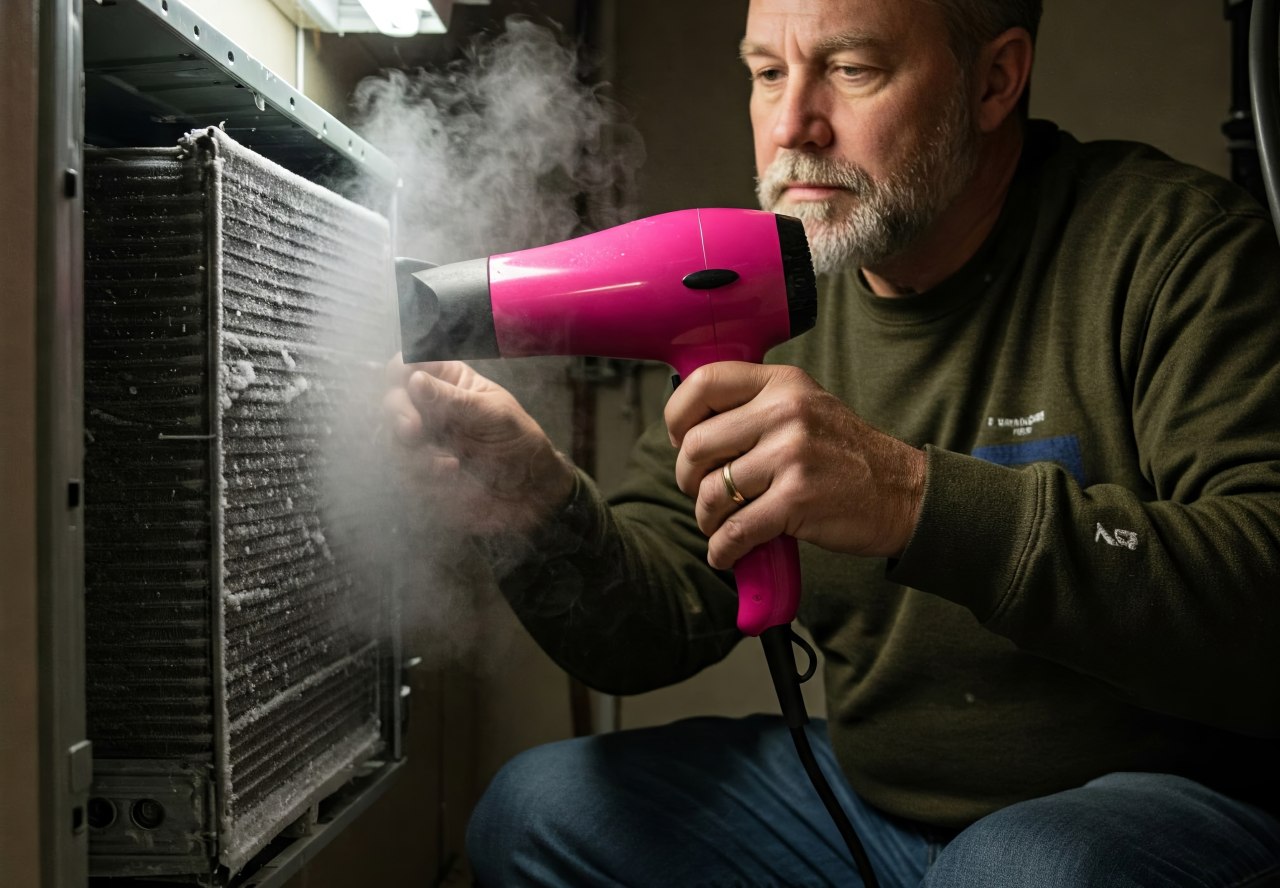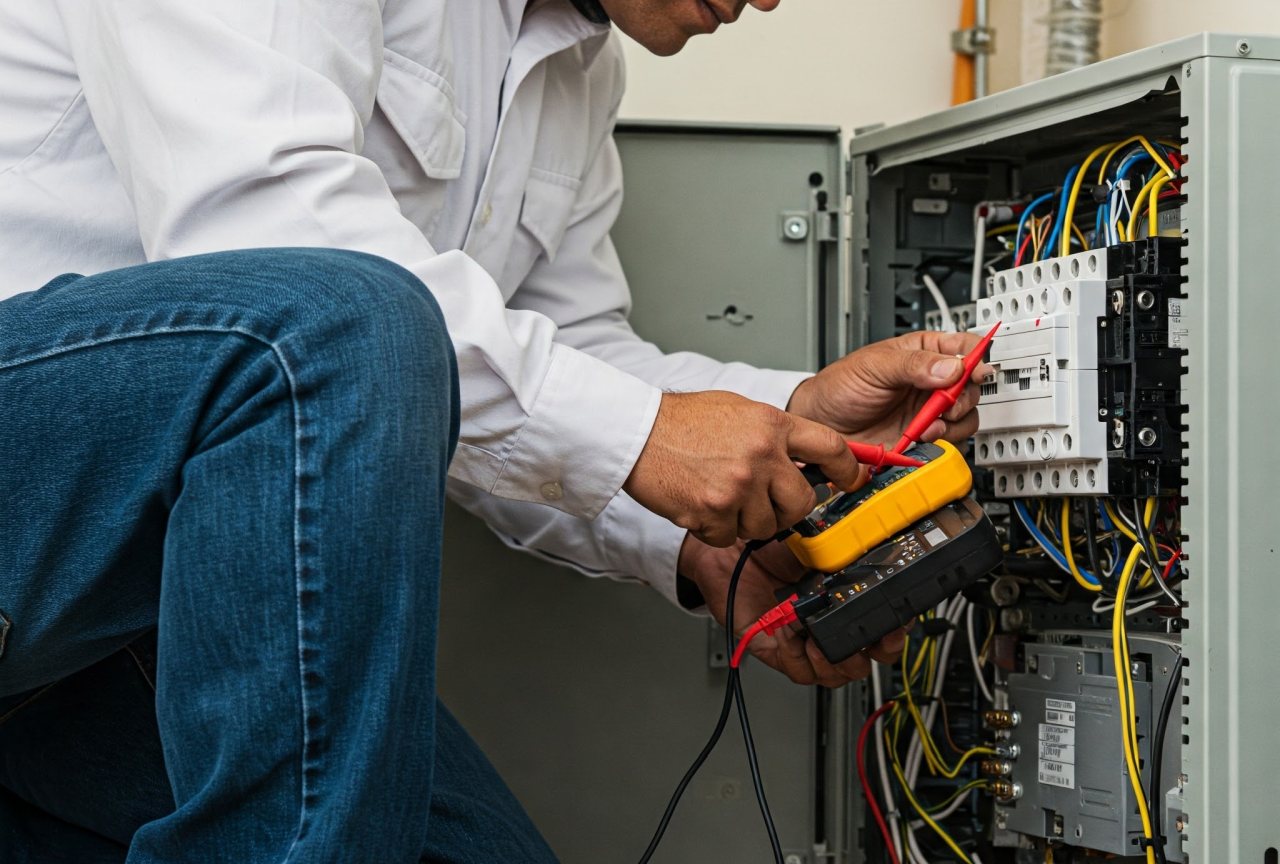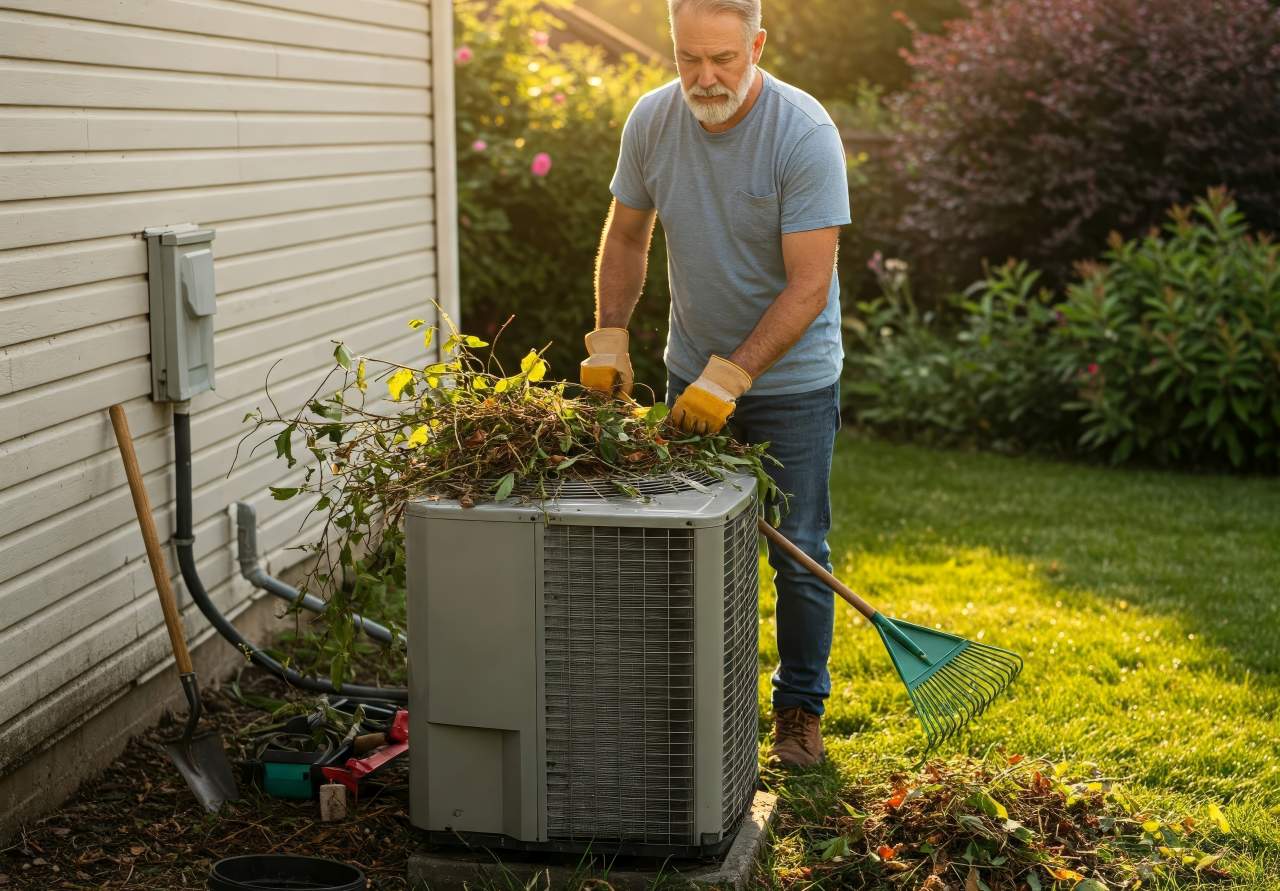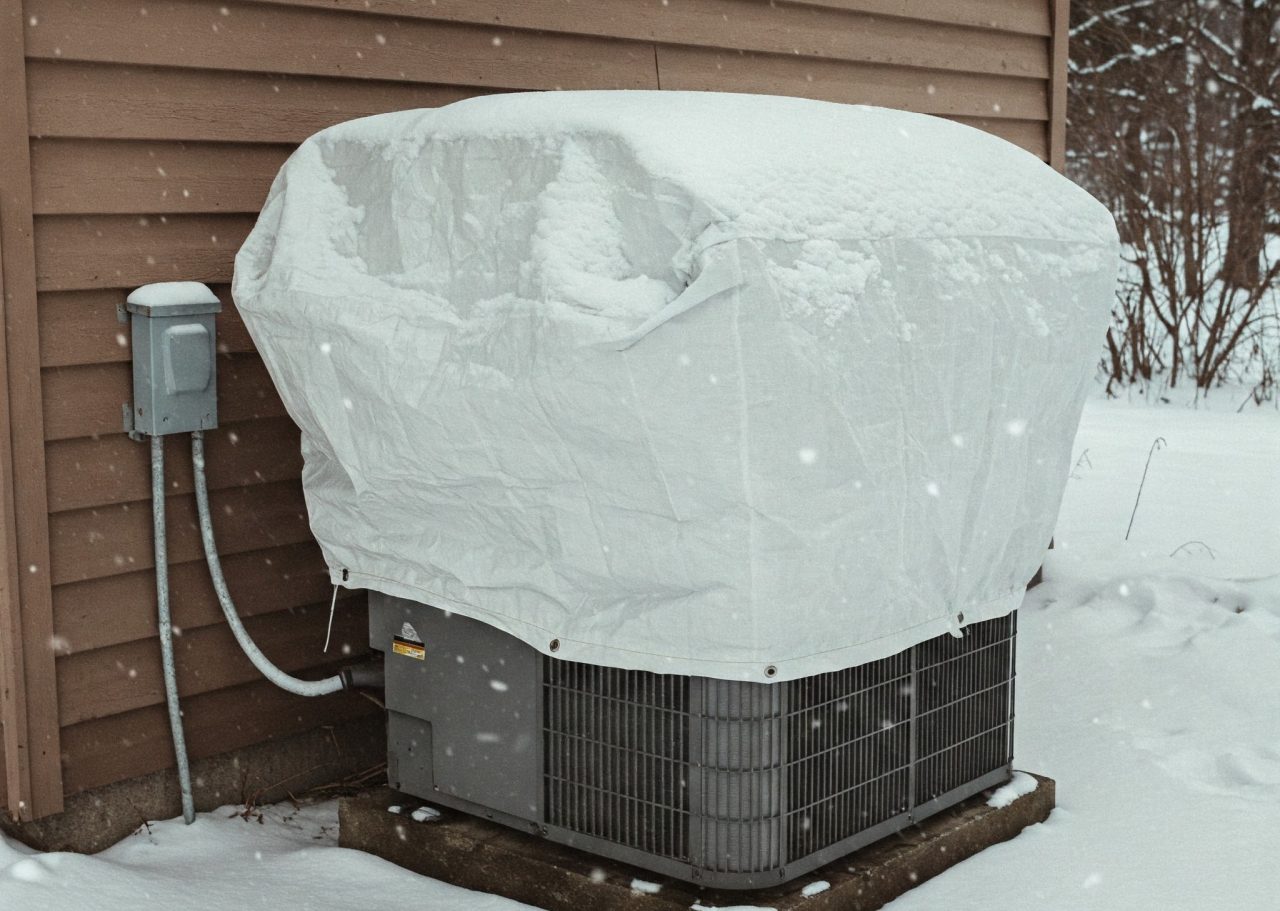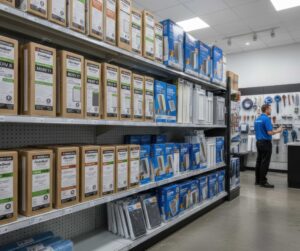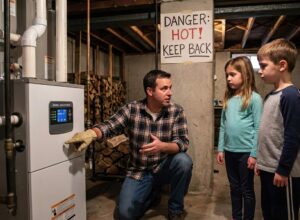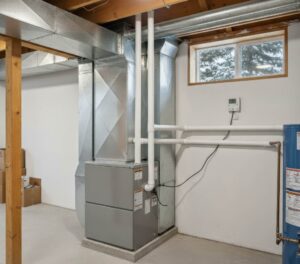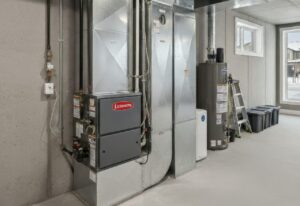Ice is usually a welcome sight on a hot summer’s day in Alberta—but not in your air conditioning unit. A frozen-up AC unit blowing warm air can be alarming as you try to cool down in the heat, and a beautiful summer’s day can quickly turn sweltering.
Fortunately, there’s often a simple reason for a frozen-up air conditioner. Ice generally forms due to a lack of airflow. This could be due to a filter that needs changing but other causes may need deeper troubleshooting and professional AC repairs.
Let’s find out more about the main causes, fixes, and when to call an HVAC professional…
Frozen Up AC—Main Causes and Fixes
A frozen-up AC is usually due to restricted airflow from blocked filters, vents or ductwork but could also be from low refrigerant levels, thermostat or fan issues or dirty evaporator coils. First, thaw the unit out and replace the filter as a simple DIY fix. Other causes will need deeper troubleshooting and professional AC repairs.
Let’s take a closer look at the causes of a frozen AC and what to do if you’re facing this issue right now with your HVAC system…
MAKE THE RIGHT HEATING & COOLING DECISIONS…
For over two decades, Alberta Mountain Air has helped Calgarians solve heating and cooling problems and maintain ideal comfort levels. Get in touch online for a quote.
Common Signs Your AC is Frozen
Ice on an AC unit is one of the more obvious signs of an air conditioning problem, often considered an AC emergency. However, the causes are sometimes misunderstood, leading to unnecessary callouts and costs for homeowners.
If the ice buildup is not immediately apparent, the first sign of a frozen AC may be the lack of cool air blowing from the unit, which can quickly turn the home into an oven on a hot summer’s day in Calgary.
Here’s a summary of all the main signs to look for to identify a frozen-up AC system:
- Visible ice on the unit: any visible ice on the AC unit should be thawed, and the system checked by a professional if it happens again.
- Visible frost on the refrigerant lines: the insulated copper lines that carry refrigerant should be frost-free.
- AC blowing warm air: if warm air is blowing from your AC instead of cooling your home, it’s time to investigate the cause, which could be a frozen AC.
- High indoor humidity levels: this is a sign that something’s wrong, as a fully functioning AC system should remove both heat and humidity from the indoor air.
- Unusual noises from the AC: any strange noises such as banging, buzzing or hissing should be investigated.
- Reduced airflow from the vents or registers: weak airflow from the vents is a sign that ice on the evaporator coil may be blocking the airflow.
Why Does an Air Conditioner Freeze Up?
Air conditioners are full of moving parts, and many things can go wrong. If you want to understand more about how air conditioning works, check out this post.
Otherwise, let’s move on for a closer look at the main reasons why an air conditioning unit will freeze up…
Blocked or Restricted Airflow
HVAC equipment relies on the free flow of air around the system. AC airflow issues or blockages can create major problems for air conditioning units, heat pumps, and furnaces.
If the air does not flow freely in the AC system, humidity can settle on the evaporator coil and freeze. Blocked or dirty air filters are among the most common AC problems, often leading to ice formation.
Another reason for restricted airflow is blocked or closed vents, preventing cool air from blowing into the room and lowering the temperature.
Low Refrigerant Levels
AC refrigerant is essential to the cooling process in air conditioners. In well-maintained, optimal AC units, refrigerant levels should always be sufficient for effective pressure control and cooling.
If, however, a leak develops in the system, refrigerant levels may decrease. This leads to a pressure drop, which can cause the AC to freeze up.
Dirty Evaporator Coils
The evaporator coil is usually the first part of an AC to freeze if the conditions are right. Dirt, dust, and debris on the evaporator coils help create these conditions, preventing heat from being absorbed and leading to ice formation. This can spread across the coils, restricting airflow and leading to a bigger cooling problem.
Regular HVAC maintenance should include cleaning the evaporator coils to prevent the AC unit from freezing.
Thermostat Issue
If the thermostat is set too low, it can lead to ice formation within the AC system. This might happen accidentally due to settings being “nudged’ or someone in the household may deliberately turn the settings down and forget to raise the temperature back again afterward.
Fan Issues
AC units contain fans that help to circulate air through the cooling system. If the fan is blocked, malfunctioning or not starting, air will not circulate properly. This can lead to the unit freezing up.
What to Do When Your AC Freezes Up
An AC unit with ice buildup must be thawed as the first step. Beyond that, it will require a filter to be changed or professional AC troubleshooting and repairs.
Here’s a step-by-step process for dealing with a frozen air conditioner:
- Turn off the AC at the thermostat or breaker.
- Turn the AC fan to ON from AUTO so that warm air from the room circulates over the frozen coils, helping them thaw.
- Wait for the ice to melt, which will take at least a few hours (up to 24 hours for heavily frozen units). Try using a hairdryer on low speed to help melt the ice on the coils but do not use sharp objects to remove the ice.
- After the ice is cleared, leave the fan for another 30 minutes or so to dry out the coils.
- Check for air filter and vent blockages: ensure that the filter is clean and vents are unobstructed. Clean or replace the filter as needed.
- Test the AC once the ice is thawed.
- If the AC continues to freeze or blow hot air, a more serious problem will need professional AC troubleshooting.
When you thaw the frozen AC, make sure that you place containers underneath the unit for the water to drip into, as the main drain pan may overflow. Also, check the home for water damage because the AC may have frozen and thawed previously and deposited water on the floor unnoticed.
Changing the main HVAC filter every 6-8 weeks—or cleaning reusable filters if your system supports them—is recommended for optimal HVAC performance even if the AC is not freezing up. According to the United States Department of Energy (DOE), routinely changing your HVAC filter can improve system efficiency by 5 to 15 percent.
When to Call an HVAC Professional
If the problem persists or the AC continues to freeze up after you have thawed it and changed the filter, consult an AC professional.
You should also call a professional HVAC technician if you observe or suspect any of the following:
- A refrigerant leak—refrigerant must be handled only by a licensed professional.
- Electrical or fan issues—electrical issues should be handled by a licensed electrician.
- Strange noises or smells coming from your AC—this may require deeper troubleshooting by an AC professional.
How to Prevent Your AC From Freezing Again
The best way to avoid a frozen AC once you have resolved the issue is to book an annual AC tune-up before the summer. If you prefer to book end-of-summer AC maintenance, that would work too.
As a homeowner, preventative HVAC care includes regularly inspecting and replacing filters and clearing debris from around the outside unit.
A little preventative AC maintenance should be a no-brainer for Calgary homeowners because the costs of AC are high in Alberta. Looking after your investment should be a priority.
FAQs
Air conditioners usually operate within a specific temperature range. Sometimes, Calgary experiences cooler summer nights that can cause the AC to freeze over because the system pressure can fall too low and the evaporator coil gets too cold. This causes condensation to freeze. You can prevent this by not running the AC when it’s cooler than 15-16°C outside.
A frozen AC can usually be fixed relatively easily. However, if the ice damages your AC system or your unit is older than 10-15 years and freezes repeatedly, you may need to consider installing a new AC unit. Here are 10 signs that it’s time to replace your AC unit.
Ductless mini-split air conditioners are a viable alternative to central air conditioning for homes without existing ductwork. Ductless systems cool individual rooms rather than the entire home but they can experience most of the same issues as central air conditioners. Any air conditioning system is better and more reliable with proper installation and regular maintenance.
Because of the extreme winter conditions in Alberta, it’s a good idea to cover your air conditioner in winter—but if you use a full vinyl cover rather than constructing a roof for your outside unit, don’t forget to remove it before your AC kicks on in the spring or summer.
Prevent AC Problems with an Annual Tune-Up
Our team performs regular AC tune-ups and repairs for families in Alberta, keeping them comfy in their homes all year round.
All of our HVAC professionals are SAIT-certified and can help you make the right heating and cooling decisions. So, if you’re in Calgary and considering your HVAC options, contact us online.
